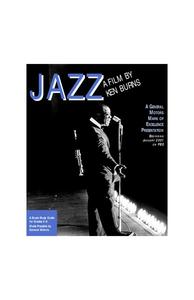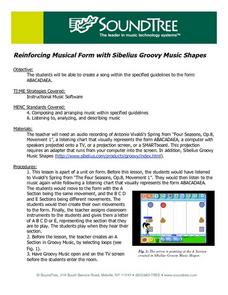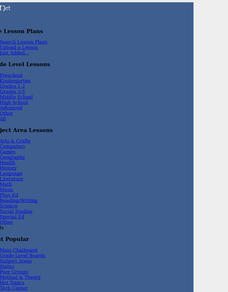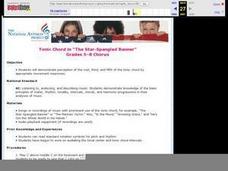Curated OER
Going Up and Down
Second graders listen to and compare music to gain understanding of melodic direction in song, discuss types of movement in song, sing song while moving to it, and create movements that show pitches of melody moving upward, downward, or...
Curated OER
A New Twist on Race Relations
Learners analyze the impact of American Bandstand on race relations. In this race relations instructional activity, students use the music and dance show American Bandstand to learn about race relations. Learners categorize pivotal...
Curated OER
J.S. Bach (1685-1750): Sarabande and Gigue form Partita no.4 in D major, BWV 828
Challenge your music students with this worksheet, which includes twenty-one questions about J.S. Bach's Sarabande and Gigue form Partita no.4 in D major, BWV 828. Students compare the two sections (bars 1-12, bars 13-38) by answering...
Curated OER
Analyzing Two Dances and Making a Dance Map: The Nutcracker
Students discuss dance elements and create a dance map. They choose a dance theme and incorporate movement into their dance maps and choreography. They also experiment with different types of music.
Curated OER
Back to the Classics
Students closely examine chamber music as it has changed from the Middle Ages to today. They work in small groups to research the composers, instruments and typical presentation in 5 time periods. They write biographies and share their...
Curated OER
Art -- The Secret to Freedom
Fourth graders create a coded message in a quilt. In this art instructional activity students demonstrate the communication used by the Underground Railroad. Students work in a group to make a quilt with a code in it.
Curated OER
Rhythmic Pattern and Movement
Students practice repeating rhythmic patterns in unison. Next, students work in groups to practice an alternate rhythmic pattern to Row, Row, Row Your Boat. They create their own rhythmic patterns for the song.
General Motors Corporation
Jazz
Over the history of the world, music has been at the heart of some of the greatest social and political movements. Scholars discover their musical roots as they dive into the sounds and emotions of renowned jazz players. They see how...
Library of Congress
The Harlem Renaissance
The Harlem Renaissance brought forth many American art forms including jazz, and the writings of Zora Neale Hurston and Langston Hughes. Using a carefully curated set of documents from the Library of Congress, pupils see the cultural...
Curated OER
Romanticism 1800's
Kant and Goethe. Shelley, Wordsworth, Lord Byron, and Keats. Goya, Gericault, and Delacroix. Beethoven, Schubert, and Chopin. Romantic literature, art, and music are the focus of a presentation about the European Romantic Movement of the...
Curated OER
The Life and Music of Celia Cruz
Students create a set and design a costume for a musical performance. In this Life of Celia Cruz lesson, students study biographical facts about Celia Cruz on the exhibition web site. Then students share their creations with the class.
Curated OER
Pop Art-Reflections of the Mass Media
Students select a common object or a face, and draw or paint it on a flat surface making it larger than real life. They choose a common object or simple scene and repeat it horizontally or vertically as defined rows. They create a flat,...
Curated OER
Musical Form and Sibelius Groovy Music Shapes
Learners create a song using the form ABACADAEA. Students listen to a musical piece created by Vivaldi that is an example of this musical form. Then
learners use software to create their own musical forms representing this pattern.
Curated OER
Musical Freeze Improvisions
Students are introduced to the process of creating story from movement through improvisation and invention. When the music is playing, they move. When the music stops, the students freeze. A discussion on the role that music plays in the...
Curated OER
Movement And Rhythm In Modern Art
Learners gather around the three selected paintings. The teacher guide students in looking at different elements of the paintings and help learners make the connections between the visual art and movement skills.
Curated OER
Say It Loud!: A Celebration Of Black Music In America - Lesson 5
Students identify many genres of Black music. They listen to examples of black artists playing songs of social concious, then identify issues that are addressed by today's Black artists.
Curated OER
Three Pieces for Chamber Orchestra, Movements 1 & 2 By Arnold Schoenberg
Students study composer, Arnold Schoenberg. They compare landscapes to soundscapes and study abstract art and abstract music. They answer questions and write about both in their journals. They identify abstract artist and composers...
Curated OER
Fats Waller, Handful of Keys
Playing piano is great fun and playing jazz is even better. Kids watch a video of Fats Waller playing the song, "Handful of Keys," they then use either a piano key print out or Orff instruments to practice his signature stride piano...
Curated OER
Jazz in America Lesson Plan 7
Students survey free jazz and fusion. They explore how free jazz and fusion reflected American culture and society in the 1960s and 1970s.
Curated OER
John Lennon
Here is a great example of the type of biographical presentation your class could create. They can view this informational biography of John Lennon to learn about a famous person or as inspiration for a research project. Each slide...
Pittsburgh Ballet Theatre
West Side Story Suite and In The Night Fancy Free
West Side Story and Romeo & Juliet—two classics in their own rights that help young literature lovers better analyze different works. Learners research and compare the characters and story elements of West Side Story and Romeo &...
Curated OER
Moving and Grooving with Tempo
First graders recognize the variations of tempo in music as it changes. They repeat movements, define tempo and distinguish between fast and slow tempo while playing a teacher led game.
Curated OER
Tango Stories
Students listen to tango music and research the country it came from. In this music lesson, students find that tango music comes from Argentina. They listen and dance to the music and then write stories.
Curated OER
Tonic Chord in "The Star-Spangled Banner" (Grades 5-8 Chorus).
Learners demonstrate perception of the root, third and fifth of the tonic chord by appropriate movement responses. They analyze and describe music. Students listen to the middle C played on the keyboard and sing to it on the syllable do.

























